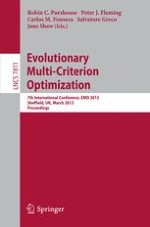2013 | OriginalPaper | Buchkapitel
Difficulty in Evolutionary Multiobjective Optimization of Discrete Objective Functions with Different Granularities
verfasst von : Hisao Ishibuchi, Masakazu Yamane, Yusuke Nojima
Erschienen in: Evolutionary Multi-Criterion Optimization
Verlag: Springer Berlin Heidelberg
Aktivieren Sie unsere intelligente Suche, um passende Fachinhalte oder Patente zu finden.
Wählen Sie Textabschnitte aus um mit Künstlicher Intelligenz passenden Patente zu finden. powered by
Markieren Sie Textabschnitte, um KI-gestützt weitere passende Inhalte zu finden. powered by
Objective functions are discrete in combinatorial optimization. In general, the number of possible values of a discrete objective is totally different from problem to problem. That is, discrete objectives have totally different granularities in different problems (In this paper, “granularity” means the width of discretization intervals). In combinatorial multiobjective optimization, a single problem has multiple discrete objectives with different granularities. Some objectives may have fine granularities with many possible values while others may have very coarse granularities with only a few possible values. Handling of such a combinatorial multiobjective problem has not been actively discussed in the EMO community. In our former study, we showed that discrete objectives with coarse granularities slowed down the search by NSGA-II, SPEA2, MOEA/D and SMS-EMOA on two-objective problems. In this paper, we first discuss why such a discrete objective deteriorates the search ability of those EMO algorithms. Next we propose the use of strong Pareto dominance in NSGA-II to improve its search ability. Then we examine the effect of discrete objectives on the performance of the four EMO algorithms on many-objective problems. An interesting observation is that discrete objectives with coarse granularities improve the search ability of NSGA-II and SPEA2 on many-objective problems whereas they deteriorate their search ability on two-objective problems. The performance of MOEA/D and SMS-EMOA is always deteriorated by discrete objectives with coarse granularities. These observations are discussed from the following two viewpoints: One is the difficulty of many-objective problems for Pareto dominance-based EMO algorithms, and the other is the relation between discrete objectives and the concept of
ε
-dominance.
